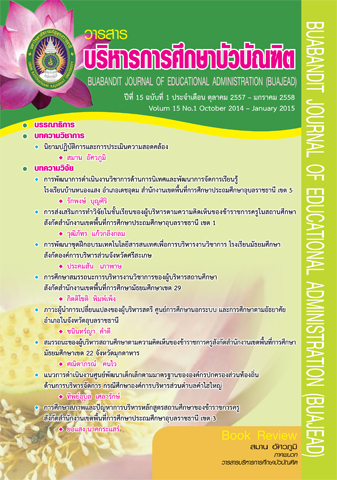การส่งเสริมการทำวิจัยในชั้นเรียนของผู้บริหารตามความคิดเห็นของข้าราชการครู ในสถานศึกษาสังกัดสำนักงานเขตพื้นที่การศึกษาประถมศึกษาอุบลราชธานี เขต 1
Main Article Content
บทคัดย่อ
การวิจัยครั้งนี้มีวัตถุประสงค์เพื่อศึกษา บทบาทผู้บริหารในการส่งเสริมการทำวิจัยในชั้นเรียนของครู ตามความคิดเห็นของข้าราชการครู สังกัดสำนักงานเขตพื้นที่การศึกษาประถมศึกษา อุบลราชธานี เขต 1 เพื่อเปรียบเทียบความคิดเห็นของข้าราชครู ที่มีตำแหน่ง ระดับการศึกษา ประสบการณ์ในการทำงาน การปฏิบัติหน้าที่ในขนาดโรงเรียนต่างกันและเพื่อศึกษาข้อเสนอแนะ และแนวทางในการส่งเสริมการทำวิจัยในชัน้ เรียน
กลุ่มตัวอย่างที่ใช้ในการวิจัยครั้งนี้ คือ ผู้บริหารจำนวน 162 คน และครูผู้สอนโรงเรียน ในสังกัดสำนักงานเขตพื้นที่การศึกษาประถมศึกษา อุบลราชธานี เขต 1 ปีการศึกษา 2554 จำนวน 355 คน รวมกลุ่มตัวอย่างจำนวน 517 คน
เครื่องมือที่ใช้ในการเก็บรวบรวมข้อมูล เป็นแบบสอบถามมาตราส่วนประมาณค่า 5 ระดับ จำนวน 54 ข้อ มีความเชื่อมั่นเท่ากับ .98 สถิติที่ใช้ ในการวิเคราะห์ข้อมูล ได้แก่ ค่าร้อยละ ค่าเฉลี่ย ส่วนเบี่ยงเบนมาตรฐาน การทดสอบค่า t และ การทดสอบค่า F เมื่อพบความแตกต่างอย่างมีนัยสำคัญทางสถิติทำการทดสอบความแตกต่างรายคู่ โดยวิธีการของ Scheffe’
ผลการวิจัยพบว่า
1. บทบาทผู้บริหารในการส่งเสริม การทำวิจัยในชั้นเรียนของครูโดยรวมอยู่ในระดับมาก เมื่อจำแนกเป็นด้าน พบว่า ด้านการส่งเสริม ให้เกิดความสำเร็จในการทำวิจัยในชั้นเรียนมีค่าเฉลี่ย สูงสุดรองลงมาคือ ด้านการสนับสนุนและ เผยแพร่งานวิจัยในชั้นเรียนและด้านการจัดสรร งบประมาณในการวิจัยในชั้นเรียน 2. การเปรียบเทียบค่าเฉลี่ยของการ ส่งเสริมการทำวิจัยในชั้นเรียนของผู้บริหารตามความคิดเห็นของข้าราชการครู มีดังนี้
2.1 การเปรียบเทียบค่าเฉลี่ย ของการส่งเสริมการทำวิจัยในชั้นเรียนของผู้บริหารตามความคิดเห็นของข้าราชการครู จำแนกตาม ตำแหน่ง พบว่า โดยรวมไม่แตกต่างกัน
2.2 การเปรียบเทียบค่าเฉลี่ย การส่งเสริมการทำวิจัยในชั้นเรียนของผู้บริหาร ตามความคิดเห็นของข้าราชการ จำแนกตามระดับการศึกษา พบว่า โดยรวมและรายด้านไม่แตกต่างกัน
2.3 การเปรียบเทียบค่าเฉลี่ยการส่งเสริมการทำวิจัยในชั้นเรียนของผู้บริหารตาม ความคิดเห็นของข้าราชการ จำแนกตาม ประสบการณ์ ในการทำงาน พบว่า ทั้งโดยภาพรวมและรายด้าน แตกต่างกันอย่างมีนัยสำคัญทางสถิติที่ระดับ .05
2.4 การเปรียบเทียบค่าเฉลี่ยการ ส่งเสริมการทำวิจัยในชั้นเรียนของผู้บริหารตาม ความคิดเห็นของข้าราชการ จำแนกตามขนาด โรงเรียน พบว่าทั้งโดยภาพรวมและรายด้าน แตกต่างกันอย่างมีนัยสำคัญทางสถิติที่ระดับ .05
3. ข้อเสนอแนะและแนวทางการส่งเสริมในการทำวิจัยในชั้นเรียน ผู้บริหารโรงเรียนควร มีการสนับสนุนด้านงบประมาณ และช่วยเหลือ ให้ครูได้มีการศึกษาค้นคว้า มีการให้ความรู้ ความเข้าใจ และความสามารถในการวิจัย โดยการจัดฝึกอบรมการวิจัยให้แก่ครู
Promotion of Classroom Research of School Administrators in Opinion of the Teachers under the Office of Ubon Ratchathani Primary Educational Service Area 1
The purposes of this study were to investigate the role of school administrators in promoting classroom research in view of the teachers under the Office of Ubon Ratchathani Primary Educational Service Area 1, to compare the obtained opinions of the samples on the basis of their position, educational level, work experience, and school size, and to study the problems and means to promote classroom research.
A total of 517 subjects including 162 administrators and 355 school teachers were employed as the sample of the study. A 5-point rating scale survey questionnaire yielding the overall reliability coefficient of.98 and containing 54 question items was used in data collection. The statistics including percentage, mean, standard deviation, t-test, F-test, and Scheffe’s test were used in data analysis.
The research findings were as follows:
1. The role of school administrators in promoting classroom research was found at a high level. The mean score showing a high level of individual aspects of promotion included completing the classroom research, distributing classroom research, and supporting research funds, respectively.
2. In the comparison of the opinions of the teachers on the basis of their position, educational level, work experience, and school size resulted in no difference at a significant level in their opinions for the overall aspects. For the individual aspects of promotion, only one aspect that is the acceptance of teachers who did the classroom research was found to be different at level .05 of significance.
3. In the comparison of the opinions of the samples that differed in education attainment was found not to be different at a significant level for the overall and individual aspects.
4. The opinions of the samples on the basis of their work experience were found to be different at level .05 of significance for the overall and individual aspects.
5. The opinions of the samples on the basis of school size were also found to be different at level .05 of significance for the overall and individual aspects.

